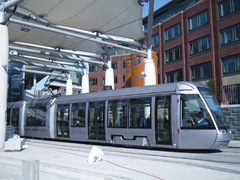Transport delays
 eolas reviews the Government’s transport infrastructure plans for the next six years.
eolas reviews the Government’s transport infrastructure plans for the next six years.
The focus on transport infrastructure “has shifted” from roads to public transport, Brian Cowen said earlier this year.
The 2006 National Development Plan (NDP) had allocated almost €33 billion to transport. However, in July the Government’s ‘New Infrastructure Priorities 2010-2016’ document announced that the transport budget has been reduced by 35.5 per cent, to €11.7 billion. This is divided almost equally between €5.77 billion for public transport and €5.97 billion for roads.
Putting this in perspective, the €11.7 billion total is less than the €12.9 billion outlined in the NDP for transport in the greater Dublin area alone.
Of the 14 major roads projects announced in the NDP, seven have been earmarked for completion over the next six years. These are the major ‘inter-urban’ motorways and the Atlantic Corridor. The ‘New Infrastructure Priorities’ document also singles out Metro North and the Dart underground as “priorities”.
The National Roads Authority has a total of 91 roads projects either at construction, route selection, feasibility study, preliminary design or sustainability phase. Of these, only four have begun construction, and one – the Castleisland bypass, County Kerry – was the only road project to start construction in 2010. Any projects on which contracts have not been signed could be postponed or cut.
In 2006, the department’s Transport 21 capital investment framework was launched. It outlined 40 key bus, rail, Luas and road projects. Of those, three Luas, one Metro, nine rail and 14 road projects have been completed or are underway and 13 are effectively on hold. However, those road, rail and Luas projects that are ‘underway’ will depend on funding and will be subject to the procurement and contract award processes.
A spokeswoman from the Department of Transport said it was important to note that no projects have been cancelled.
In addition, the NRA has proposed more toll booths throughout the country in order to raise revenue. The M1 and M3 are already tolled and the NRA has suggested five more roads for tolling:
• the N2 linking Dublin to Monaghan;
• the M7 and N7 from Cork to Limerick;
• the N11 from Wicklow; and
• the Jack Lynch tunnel and the southern ring road in Cork.
The M50 should be divided into sections with a separate charge on each, the NRA also recommended. This idea was originally suggested in their report by the Local Government Efficiency Review Group, which was tasked with helping the Government find ways of saving €500 million in the 34 local authorities.
At the beginning of October, Labour leader Eamon Gilmore said that if in power, his party would postpone Metro North and priortise those projects most likely to create jobs. However when planning permission for the project was granted, the party’s transport spokesman Joe Costello said: “The Labour Party strongly supports the Metro North Project. We recognise that it is an enormous construction project that has long-term benefits for public transport and for development in Dublin. However, in the current economic climate, given the meltdown in the economy and the crisis in the public finances, it would be extremely unwise to give a blank cheque to the Metro North Project without all the facts in our possession.”
He criticised the Government for not publishing a cost benefit analysis and said it should follow the example given by the Department of Finance in allowing the opposition’s finance spokespeople to “look at the books” before the Budget.
Fine Gael’s transport spokesman Simon Coveney, welcomed the commitment to fund significant public transport infrastructure in Dublin in the form of Metro North and the Dart underground but added the Government should be looking at new ways to fund the building of infrastructure without resorting to Government debt.
Senator Pearse Doherty, Sinn Féin’s transport spokesman, said that “taking the axe to the NDP” amounts to “economic lunacy” because it is cutting potential jobs.





